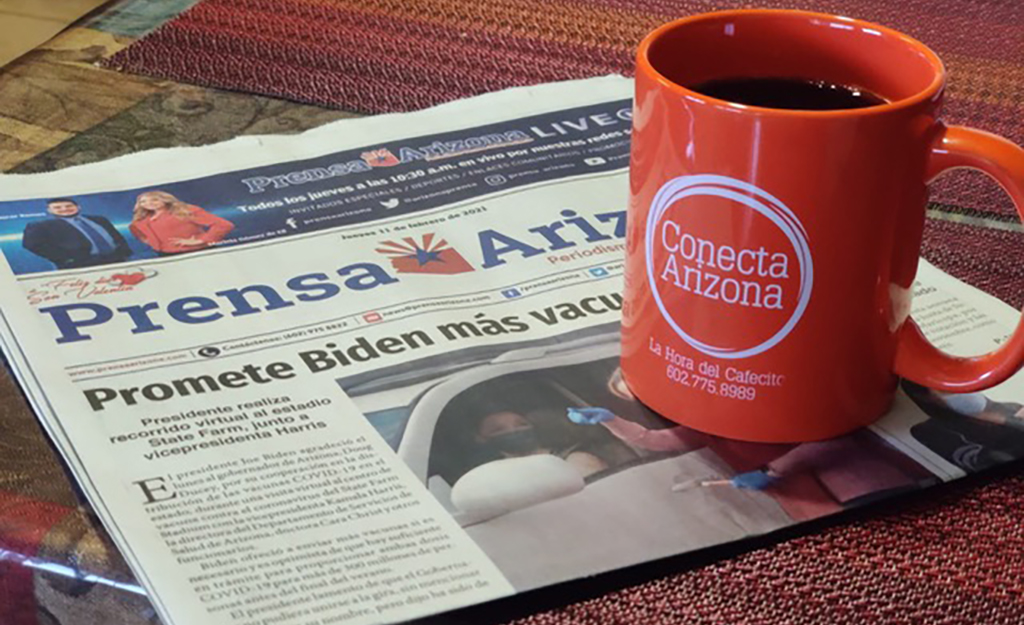This week marks the third anniversary of Conecta Arizona, a hyperlocal journalism initiative and a partner of Feet in 2 Worlds. When it first emerged at the onset of the pandemic, the project aimed to slow the spread of misinformation about COVID-19 to Arizona’s Spanish-speaking border communities. After three years, with over 864 hours of live information sessions on WhatsApp, 188 newsletters, and an award-winning podcast, Cruzando Líneas, Conecta Arizona has transformed into a multimedia news service that serves as an information-sharing platform and key resource for a community that is often neglected in the political sphere and misrepresented in the media.
“For a long time we made ourselves small trying to fit at the table where we weren’t welcomed,” said Conecta Arizona founder, journalist Maritza L. Félix. “Conecta Arizona might not be a pretty table, but here everybody fits.”
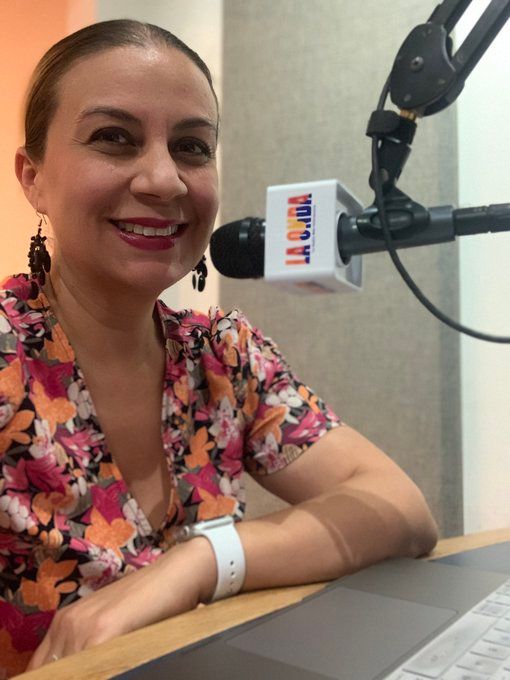
Maritza L. Félix, director and founder of Conecta Arizona. Photo courtesy of Maritza L. Felix/Conecta Arizona.
Félix grew up near the border in Sonora, Mexico. In 2006 she immigrated to California, moving to Arizona three years later. On May 11, 2020, she founded Conecta Arizona as a WhatsApp group that dispelled Covid myths and shared factual information among her family and friends on both sides of the U.S.-Mexico border. At the start of the pandemic, people would contact Félix asking her if it was true the coronavirus could not survive in the Arizona summer heat, or if drinking lemon tea and adding baking soda could help reduce the chances of contracting COVID-19.
These myths might sound silly three years after the breakout, but in that moment Félix immediately recognized the dangers of misinformation—especially for the Spanish-speaking border community that was being neglected by journalists and public servants alike. Though more than 20% of Arizona’s population speaks Spanish, at the time there were no other Arizona media outlets regularly delivering information and updates in Spanish regarding COVID-19. Even more surprising, Arizona’s Department of Health Services had virtually no online information about the coronavirus in Spanish.
This drove Félix to take matters into her own hands. What began as a twelve person chat group meant to last only a few months now boasts more than 1,000 members on WhatsApp, with over 100,000 people reached collectively through all their platforms and collaborations. In addition, on its anniversary day, Conecta Arizona launched a new initiative, Plumas Invitadas, which aims to provide a space for written submissions from the community and help amplify local voices and histories.
The Conecta Arizona founder wrote in her NBCU Academy article, “We put down roots in a community that was hungry for a different type of local journalism, where inspiration, not extraction, drives us to create original content with our narratives, our accents, and our identity.”
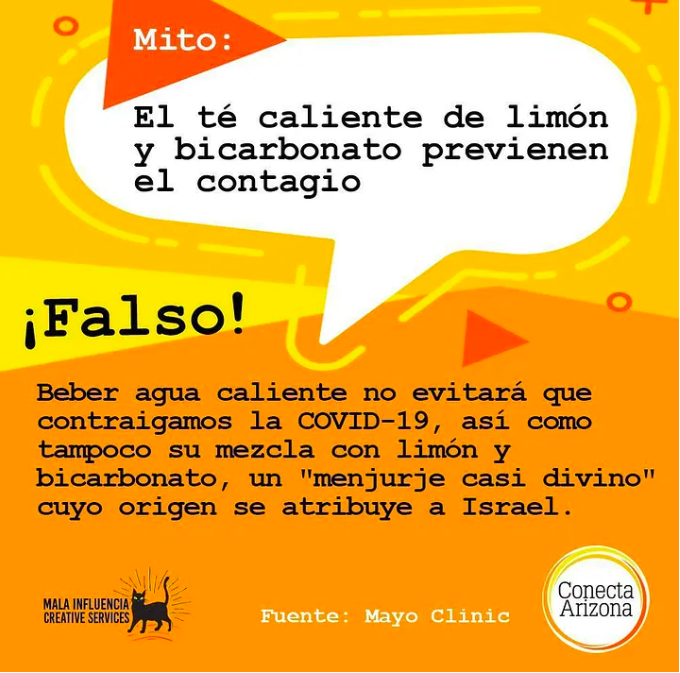
Conecta Arizona has debunked more than 300 myths about the pandemic and the border. Photo courtesy of Maritza L. Felix/Conecta Arizona.
Conecta Arizona’s success comes from its hyperlocal journalism, news and stories that focus on the community in a very specific geographic area and that often comes from people outside the journalism establishment. Félix wanted to make information more accessible to her community, which encouraged her to think beyond traditional media like TV and print. Through Conecta Arizona, she tested and proved that platforms like WhatsApp––often used to disseminate misinformation––can also be extremely helpful tools to combat it because of their effectiveness in reaching Spanish-speaking Latine communities. According to Nielsen, Latines are 57% more likely than other groups to rely on social media as their source of information on the coronavirus, and young Latines communicate over apps like WhatsApp and Telegram at twice the rate of the general population, leading to a higher risk of misinformation being shared.
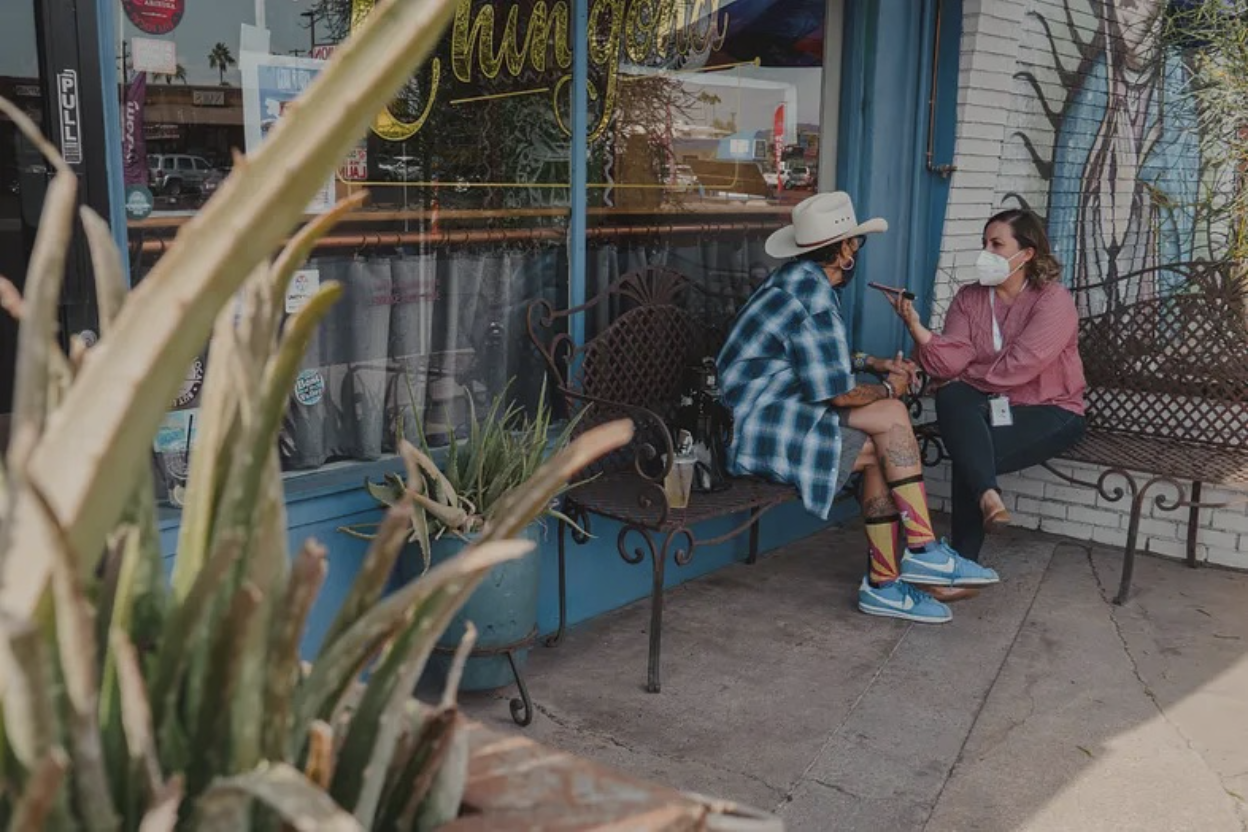
Election coverage in Arizona 2020. Maritza L. Félix interviewing Chef Silvana Salcido. Photo by Daniel Robles.
Félix is not just reaching an audience, she is creating a community. At the heart of Conecta Arizona is La hora del cafecito. The “Coffee Hour” is a daily text conversation and informative session Félix facilitates on WhatsApp every weekday. All members log in for La hora del cafecito after receiving a message from their Conecta Arizona host with a summary of news about the U.S. and Mexico. From there, participants make comments, ask questions, and communicate with each other through texts or audio messages. Members will share what they have seen on their own social media, like YouTube videos or TikTok posts, and Conecta Arizona offers information to fact-check their content.
Conecta Arizona also creates space for members to learn and discuss controversial topics, like abortion and the coronavirus vaccine. Félix said holding space for uncensored and difficult discussions is a primary goal of the organization, because these topics “are already a part of life” for her readers, listeners and followers. She said, “It is a priority for Conecta Arizona to encourage them to feel confident in speaking and expressing themselves in [the] group.” She says the group conversations have led community members to feel empowered and informed on these issues, in a way that just reading about them might not. One participant, for example, shared with Félix that the conversation on La hora del cafecito helped them make an informed decision about whether or not to vaccinate their son.
“We love La hora del cafecito! Now we know each other beyond our names and phone numbers,” Félix writes. “We have been through grief and loss, elections, a pandemic and border restrictions that seem to never end. We are a diverse and proud family. We are a community that reinvents itself through dialogue.”
Conecta Arizona also covered the 2020 presidential election and 2022 midterm election.
Since 1990, Arizona’s Latine population has tripled, and in 2020 they were instrumental in President Joe Biden winning the state. Conecta Arizona has produced 13 electoral guides and answered over 500 questions in Spanish on the spot through WhatsApp and other outlets. “In covering the elections, Conecta Arizona became a reliable source of information for Spanish-speaking families in the United States and for Mexican neighbors who had little or no understanding of the US electoral process,” wrote Félix. Some Conecta Arizona followers who voted in the 2020 election attribute their participation to Conecta Arizona making them feel their vote mattered.
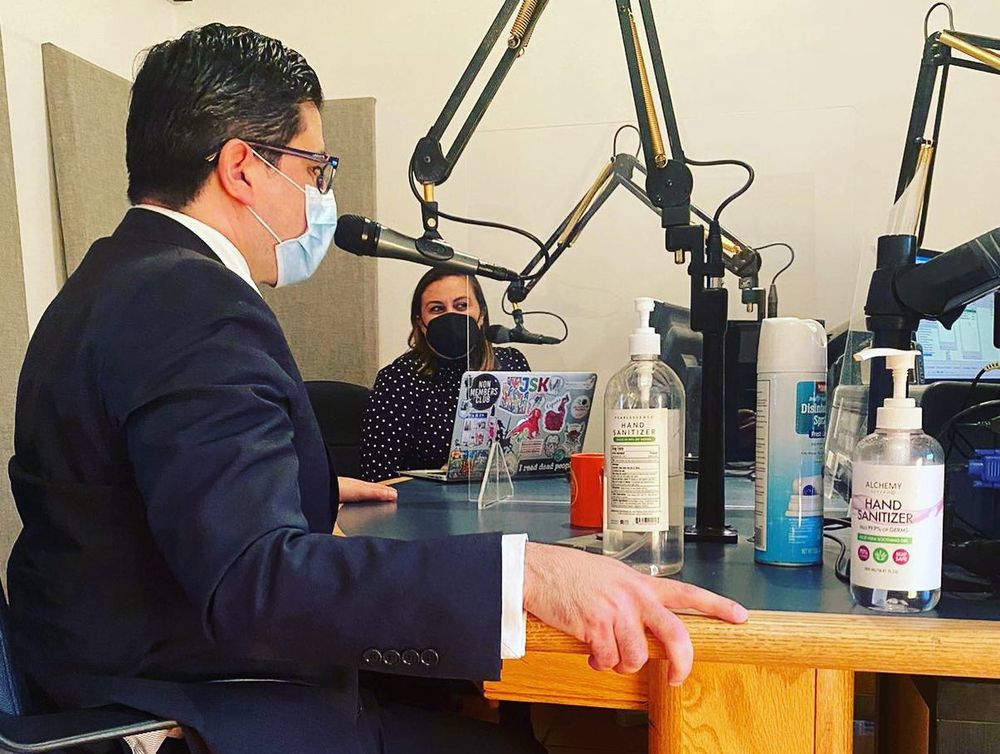
Maritza L. Félix interviewing the Mexican Consul in Phoenix during the first Conecta Arizona radio show. Since their launch, they have conducted more than 347 on-air interviews.
Photo courtesy of Maritza L. Felix/Conecta Arizona.
Once a week, Conecta Arizona hosts a special La hora de cafecito, with an expert. The featured expert provides in-depth information on a topic and answers questions often about misinformation or disinformation messages that have been circulating around the community. “We started inviting doctors, immigration attorneys, and border-issues specialists to discuss what these messages were saying, to explain why they were false,” Félix told the New Yorker. Previous guests have also included psychologists from both sides of the border, a Catholic priest, and the Mexican Consul. Discussion topics and questions from the community range from serious and practical, to light and personal. During a recent discussion on artificial intelligence for example, a group member wanted to know how to use AI to make their profile more popular on Tinder. All expert sessions are completely uncensored, Félix emphasized—meaning community members are allowed to ask the expert any questions and their phone number remains available in the chat. “People still call the Mexican Consul on his personal number and ask him questions,” Félix said.
John Rudolph, Feet in 2 World’s founder and Félix’s mentor, described the significance of her work. “She is able to connect to her audience in ways that most other journalists, including me, can only dream about,” he said. “She’s so good at including the audience in the conversations. The audience is the story.”
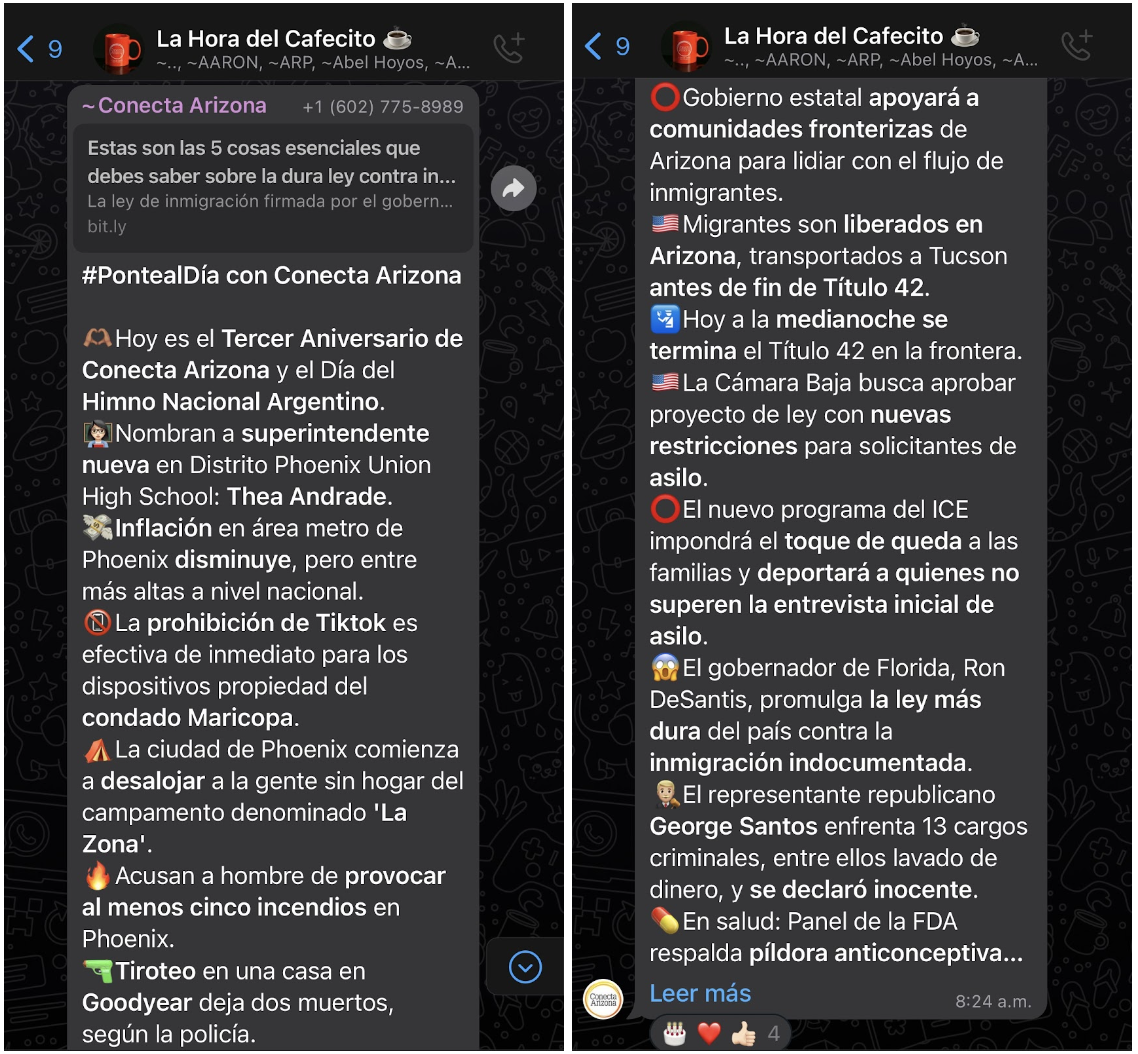
Screenshots from La hora del cafecito news bulletin on WhatsApp for their third anniversary.
Photo by Paloma Moreno Jiménez.
The success of Conecta Arizona has not come easily. First, Félix said, she had to gain the community’s trust. In her previous roles Félix worked as a TV journalist, where she recalls the network passing on important stories because they weren’t “news worthy.” These are the stories that Conecta Arizona focuses on. “Listening to a person, not to extract information or a story from them, but just because listening is valuable,” Félix expressed. “The weaknesses of one are the strengths of others. [Conecta Arizona] is always going to start at the center of the community because the point is to serve locally.”
Félix received the John S. Knight Journalism Fellowship for two consecutive years at Stanford University and the Executive Program in News Innovation and Leadership at the Craig Newmark Graduate School of Journalism, helping her build a long-term development plan for Conecta Arizona.
Another effort of Conecta Arizona is to expand and reframe stories the media tells about the border. Their podcast, Cruzando Líneas, tells stories about the U.S.-Mexico border reported and narrated by journalists from the region. Félix is one of them, “The border is my home, my inspiration, my patio, my office,” she said. “Since I was a little I would cross back and forth, privileged, I grew up seeing both sides of the border as normal.”
Speaking directly to the listener in the introduction of the show, Felix extends an invitation: close your eyes and let’s go to the border. What do you think?
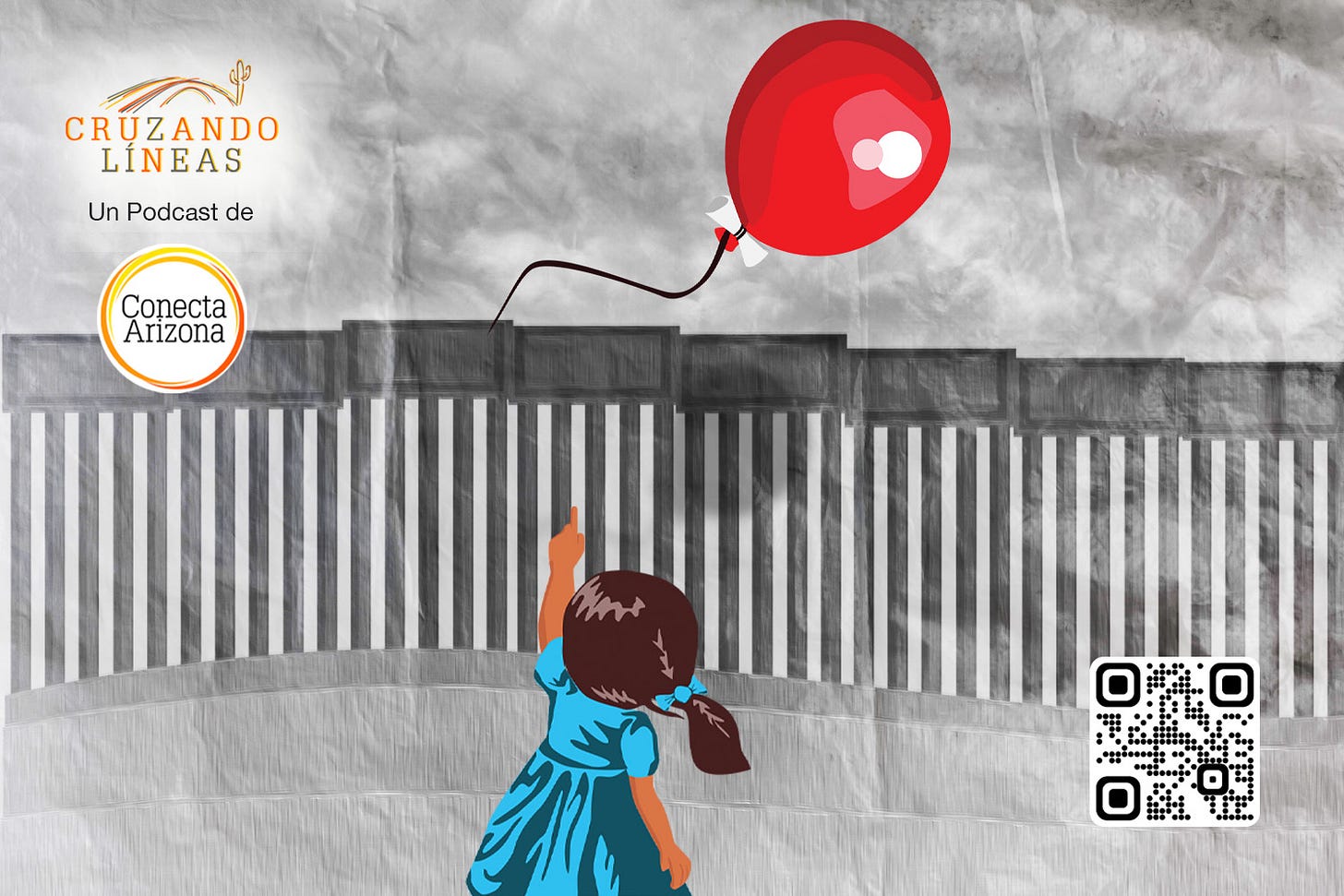
The first episode of Cruzando Líneas, El Globo. Illustration by Daniel Robles.
While many people may think of drugs or crime when picturing this part of the country, Félix sees a different, often under-reported side of the community. “I see myself eating a burrito at the border, or crossing to buy my wedding dress,” she explained. Much of Conecta Arizona’s coverage highlights the humanity of the border. “Contamos las luces porque todos los demás cuentan las sombras,” Félix said. We bring stories of light because everyone else tells about the shadows.
Feet in 2 Worlds is supported by The Ford Foundation, the John D. and Katherine T. MacArthur Foundation, the David and Katherine Moore Family Foundation, the Ralph E. Ogden Foundation, an anonymous donor, and readers like you.


